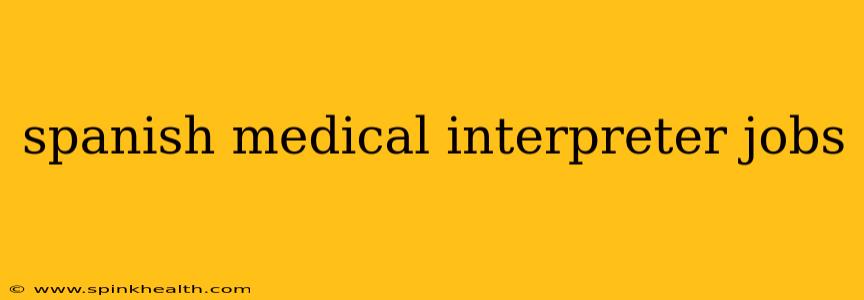The rhythmic pulse of a heartbeat, the hushed urgency of a medical consultation – these are the soundscapes of a Spanish medical interpreter's world. It's a profession demanding not just linguistic skill, but also empathy, precision, and a profound understanding of both medicine and culture. If you're considering a career path that blends language mastery with the profound impact of healthcare, then understanding the landscape of Spanish medical interpreter jobs is crucial. This journey will unravel the intricacies of this fulfilling, yet challenging, career.
What Does a Spanish Medical Interpreter Do?
A Spanish medical interpreter acts as a bridge between healthcare providers and Spanish-speaking patients. This isn't just about translating words; it's about conveying the nuances of meaning, ensuring accurate understanding of complex medical information, and fostering trust in a potentially stressful environment. Think of it as a high-stakes game of verbal Jenga, where each word carefully placed contributes to the overall stability of patient care. One misplaced word could have devastating consequences.
Their responsibilities extend beyond simple word-for-word translation. They need to:
- Interpret during consultations: This includes doctor-patient conversations, but also interactions with nurses, specialists, and other medical staff.
- Translate medical documents: This could range from discharge summaries and test results to consent forms and insurance paperwork.
- Maintain confidentiality: Patient privacy is paramount, and interpreters are bound by strict ethical guidelines.
- Navigate cultural differences: Understanding cultural sensitivities is vital for effective communication and building rapport with patients.
- Adapt to various medical settings: From hospitals and clinics to nursing homes and rehabilitation centers, the work environment can be diverse.
What are the Requirements for Spanish Medical Interpreter Jobs?
The path to becoming a successful Spanish medical interpreter requires dedication and a multifaceted skill set. While specific requirements vary by employer and location, here's a general overview:
- Proficiency in both Spanish and English: This isn't just about fluency; it demands a deep understanding of medical terminology in both languages.
- Medical Terminology Knowledge: A solid grasp of medical vocabulary, anatomy, and procedures is essential. This often involves dedicated study and potentially certification programs.
- Strong Interpreting Skills: This includes the ability to interpret simultaneously (real-time) and consecutively (after the speaker finishes).
- Excellent Communication Skills: Clear, concise communication is paramount, both verbally and, in some cases, in writing.
- Empathy and Cultural Sensitivity: Understanding and respecting the diverse cultural backgrounds of patients is crucial.
- Professionalism and Ethical Conduct: Maintaining confidentiality and adhering to ethical guidelines are non-negotiable.
How Much Do Spanish Medical Interpreters Make?
Salaries for Spanish medical interpreters can vary based on experience, location, employer (hospital, agency, freelance), and the type of interpreting (in-person vs. remote). While precise figures are difficult to pinpoint universally, expect a range that reflects the high demand and specialized skills required. Researching specific job postings in your area will give you a clearer picture of typical salary ranges.
Where Can I Find Spanish Medical Interpreter Jobs?
The hunt for Spanish medical interpreter jobs can lead you down several exciting paths:
- Hospitals and Clinics: Many healthcare facilities directly employ interpreters or contract with interpreting agencies.
- Medical Interpreting Agencies: These agencies often place interpreters in various healthcare settings.
- Freelance Work: Building a freelance client base can offer flexibility, but requires strong self-marketing skills.
- Online Platforms: Several online platforms connect interpreters with clients seeking their services.
What Certifications are Available for Spanish Medical Interpreters?
Professional certification demonstrates competency and can enhance job prospects. Several organizations offer certifications, often requiring rigorous testing and proof of experience. These certifications demonstrate dedication to the field and elevate your credentials above the competition. Researching the available options and the criteria for each will empower you to make an informed decision about pursuing certification.
What is the Job Outlook for Spanish Medical Interpreters?
The demand for qualified Spanish medical interpreters is strong and is expected to remain robust in the coming years. The increasing diversity of the US population, coupled with the growing need for accessible healthcare, ensures a consistent need for professionals skilled in bridging the language gap. This signifies a career path with potential for growth and stability.
This exploration of the world of Spanish medical interpreter jobs unveils a career path that offers both professional fulfillment and significant societal impact. It's a journey of constant learning, demanding both linguistic finesse and profound empathy. The rewards, however, are immense—the opportunity to play a vital role in ensuring that healthcare is accessible to all.

